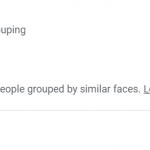
2H 2018 Quick Links, Part 3 (Keyword Advertising)
* St. George Executive Shuttle LLC v. Western Trails Charter & Tours LLC, 2018 WL 3350348 (D. Utah July 9, 2018). This is a competitive keyword advertising lawsuit involving the purported trademark “St. George Shuttle” (St. George is a city…

2H 2018 Quick Links, Part 2 (Trademarks)
* Chanel, Inc. v. Wgaca, 2018 U.S. Dist. LEXIS 158077 (SDNY Sept. 14, 2018): Chanel’s amended complaint plausibly alleges that WGACA’s use of the hashtag #WGACACHANEL infringes Chanel’s trademarks. It alleges that WGACA conjoined its acronym with the Chanel trademark…
2H 2018 Quick Links, Part 1 (Copyright)
* Capitol Records LLC v. ReDigi, Inc., No. 16‐2321 (2d Cir. Dec. 12, 2018): “ReDigi version 1.0’s process for enabling the resale of digital files thus inevitably involves the creation of new phonorecords by reproduction, even if the standalone digital…
Ninth Lawsuit Against Social Media Providers for “Materially Supporting Terrorists” Fails–Clayborn v. Twitter
This is the ninth different case where a court concludes that social media services aren’t liable for providing “material support” to terrorists. This particular litigation involves the San Bernardino shooting, but the underlying incident doesn’t matter much. Instead, the court…
When a $1M+ Publicity Rights Damages Award Isn’t a Win–Olive v. GNC
This case provides a fascinating look into the rough-and-tumble world of publicity rights damages. It raises the philosophical, and intensely practical, question of just how much a face is worth. The answer: a lot, but not nearly as much as…
Best and Worst Internet Laws [Repost from Concurring Opinions’ Archive]
[In 2007, I guest-blogged at the group law professor blog Concurring Opinions. With the demise of that blog, I am now archiving my guest posts on my own blog. This post first appeared on February 15, 2007.] __ [Preface: I’ve already…
Real Estate Appraisals and Copyrighting Facts [Repost from Concurring Opinions’ Archive]
[In 2007, I guest-blogged at the group law professor blog Concurring Opinions. With the demise of that blog, I am now archiving my guest posts on my own blog. This post first appeared on January 28, 2007.] As reported by the Washington…
MySpace Sued for Facilitating Offline Sexual Assaults [Repost from Concurring Opinions’ Archive]
[In 2007, I guest-blogged at the group law professor blog Concurring Opinions. With the demise of that blog, I am now archiving my guest posts on my own blog. This post first appeared on January 18, 2007.] AP reports that four families…

Google Photos Defeats Privacy Lawsuit Over Face Scans–Rivera v. Google
This case provides a glimpse into the legacy of the Supreme Court’s Spokeo decision on the injury-in-fact requirements for Article III standing in federal court. When it was issued, I called Spokeo a “jurisprudential clusterfuck.” Indeed, the subsequent caselaw has been…
Avvo Defeats False Advertising Lawsuit Alleging Pay-to-Play–Davis v. Avvo
The plaintiff alleges that Avvo provides editorial benefits to lawyers who advertise on Avvo, which causes the advertisers to get prospective clients who would have chosen the non-advertising lawyers. There are some parallels to the lawsuits against Yelp alleging pay-to-play,…
